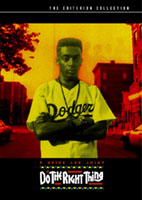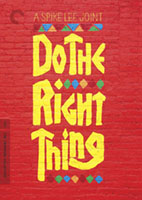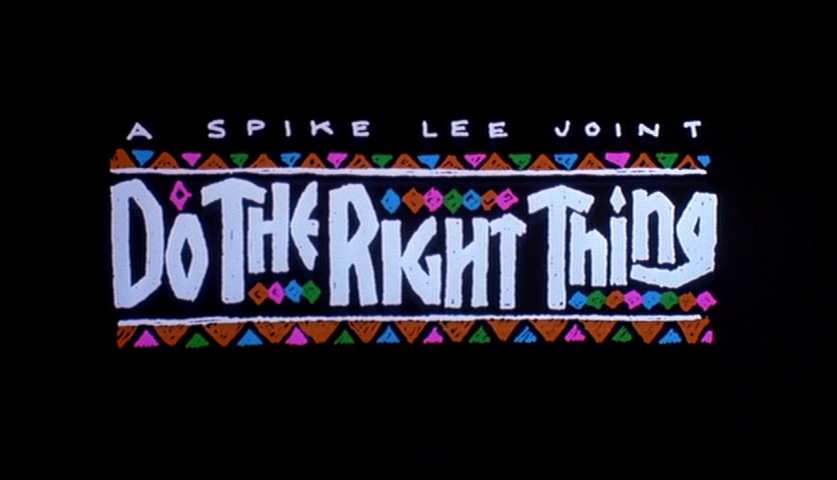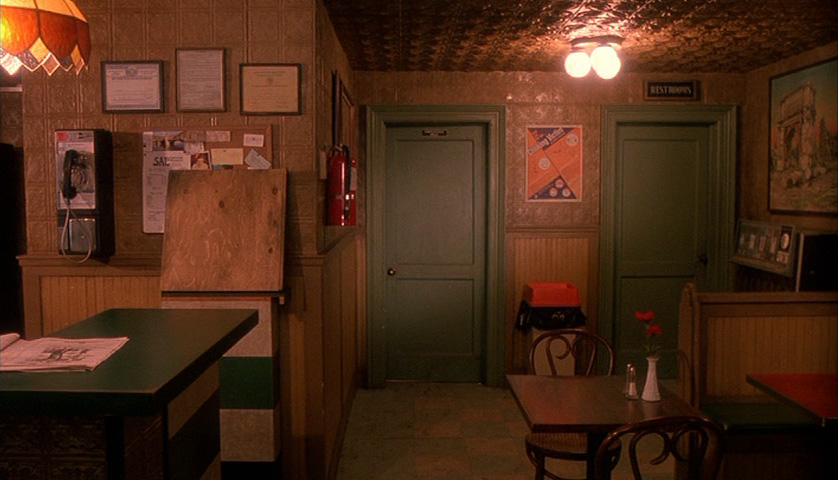2001:  2019:
2019: 

written and directed by Spike Lee
Criterion #97.
A vibrant, strong, eccentric piece of filmmaking; a shining example of what “independent film” can offer. For me it was also painful. Because it is ultimately wrong on a subject on which it is, to my mind, dangerous to be wrong.
I have been avoiding writing this entry for months because I dread having to put any of this on record. But I’m going to. Here’s how I see it.
Spike Lee is a born aesthete who feels obligated to pretend to be political. He has a compulsion to present himself as a maker of “statements” despite having no natural inclinations in that direction. His nature is emotional rather than critical, and his thinking tends to be muddled; he knows this is a liability, but rather than play to his strengths, he doubles down. And then as a defense against being found out, he adopts a posture of prickly righteousness, and a smokescreen of calculated provincialism. Ya dig? Sho nuff.
Let me please be very clear here: there is nothing wrong with being essentially a feeling person rather than a thinking person. That’s a good way to be. The thing that distresses me is the pretending otherwise, to the point where in service of the pretense you start disregarding your actual intuitions. That psychological maneuver is the source of all the world’s ills, and it upsets me to experience it in a work of art.
Do the Right Thing is instinctively compassionate to everyone on screen. The compassion is fundamental to the artistic vision; it’s apparent in the screenplay, the image, the color and sound. We get a portrait of a neighborhood — affectionate, whimsical, theatrical, wistful, Our Town — with specific attention to the fact that the life of the neighborhood, its day-to-day function, is dependent on delicate negotiations and compromises across social and racial divides.
The movie is about the fact that those underlying social fault lines are liable to split wide open and spew magma any time the human temperature rises. It says: society is fragile and our simmering resentments and prejudices are an eternal threat to it. Whether those resentments are fueled by big offenses or little ones, actual injustices or imagined ones — or some blend of the two, which, as the movie implies, is always the case — the anger itself is a destructive force, not a constructive one, and so for the sake of our families and neighbors, for the sake of the daily life that this movie celebrates in its every shot, that anger needs to be held in check by love and compassion. Or rather, anger itself deserves compassion, because it is human; it is us; it is the people in our neighborhood. Compassion for anger is the necessary antidote to anger.
That’s a really good message.
At the climax of the movie, Spike’s onscreen character, stirred to fury by a senseless death — and a lifetime of powerlessness — shouts “hate!” and incites a riot. The next day he’s cooled off again and his thoughts have returned to peaceable everyday concerns — getting paid, getting by. At this point, the message should be: his fury of the night before deserves compassion… but, obviously, not endorsement. It was, after all, purely destructive; it was a manifestation of the force of chaos that lives in everyone.
Everything about the movie has prepared us to parse the events this way. Everything about the movie has told us that “justice” is an elusive and subjective consideration compared to the absolute primacy of LOVE and HATE. An act of hate is unfortunate; an act of love is valuable.
And yet that’s not where Spike goes. He has his character be insistently, defiantly uncontrite, and then closes the film on paired quotes about violence, from Martin Luther King Jr. and Malcolm X. The King quote says essentially that violence is immoral and self-defeating. The Malcolm X quote:
I think there are plenty of good people in America, but there are also plenty of bad people in America and the bad ones are the ones who seem to have all the power and be in these positions to block things that you and I need. Because this is the situation, you and I have to preserve the right to do what is necessary to bring an end to that situation, and it doesn’t mean that I advocate violence, but at the same time I am not against using violence in self-defense. I don’t even call it violence when it’s self-defense, I call it intelligence.
There is no other way to read the movie than that Spike Lee thinks this quote, about “bad people” and “doing what is necessary” and “self-defense,” relates directly to Mookie destroying the pizza place. But it doesn’t; it can’t. That act was an explosion of rage — sympathetic rage, rage that deserves compassion, but rage. That is the opposite of what Malcolm X is talking about, if we take him at his word. He is talking about combating an oppressor. The movie has gone to some lengths to be clear that Sal, the owner of the pizza place, is not in any essential way “a bad person,” and that the pizza place is merely a locus for resentments, rather than a threat against which “self-defense” is “necessary.” Furthermore this is all a bait and switch; Spike has suddenly substituted “violence,” a word not used before, for HATE, the real recurring concern of the movie. Malcolm X isn’t saying anything about “hate.”
Mookie does not believe in change; he is not striving for change; he does not achieve change. He gets nothing good and he hurts nothing bad. He is not employing violence as a means to any end. He simply living out the anger that he feels.
I think what’s going on is: Spike wants to dignify and give voice to hate, to the deep fury that drives the riot; he wants the audience to know they can’t just scold it out of existence. It exists, it’s real, it merits attention and it deserves compassion. That’s all well and good. But at the critical moment he loses the courage of his convictions. He anticipates the audience withholding that compassion, and that makes him feel defensive, so he decides to start arguing back in his put-on “political” voice: “well, violence can be a form of protest action, and given the way things are in this country” blah blah blah. It’s non sequitur in service of an evil conclusion: “Actually acts of hate are valuable.” That’s a profound betrayal of everything this movie has been about.
This stuff matters. The heat is rising on all of us, and it makes an enormous difference to the world whether or not we know what to do with the feelings it stirs up. There is really no more vital issue. We all get angry, and we’re only going to get angrier in the years to come. Clinging to that anger because we don’t know how to forgive it, clothing it in a pretense of purpose, calling it “the right thing” because we don’t dare admit to having been hot-headed, is deadly.
This is the real answer. The movie offers it to everyone else but doesn’t know how to take it to heart.
When Radio Raheem talks about the opposing forces of LOVE and HATE he has it both ways. First he locks fingers and says that they’re “static,” and then he has them duke it out and says that LOVE wins the fight after all. Which is it, Spike?
The final image of Martin Luther King and Malcolm X shaking hands suggests some kind of yin-and-yang equilibrium. But that’s horrible! Just because something is a duality doesn’t mean it needs to be kept “in balance”! Between LIFE and DEATH, we can and should confidently throw in our lot with LIFE; DEATH will take care of itself. In LIGHT we can see what we’re doing, in DARKNESS we can’t. People don’t pray to the beautiful dyad of GOD and THE DEVIL; they pray to GOD. Christ didn’t teach LOVE and HATE, dude. What are you thinking?
Radio Raheem: “If I love you, I love you. But if I hate you…”
Mookie: “There it is: love and hate!”
“There it is: love and hate!” sums up Spike Lee: He knows there’s a topic here and he knows he’s putting it onscreen somehow, but he doesn’t know what he’s actually saying. And he’ll start any fight he needs to start to keep it that way. From a Roger Ebert piece:
Lee says he has been asked many times over the years if Mookie did the right thing. Then he observes: “Not one person of color has ever asked me that question.”
This is an utterly infuriating non-answer, because it’s demonstrably a lie — google “did Mookie do the right thing” for endless debates on the question by black writers, or just ask any high school teacher who has ever taught this movie. I actually found competing apologists for this quote: some that said “what he’s saying is that obviously burning down a pizza place is not ‘the right thing,’ but that goes without saying, and white people only fixate on it because they’ll do anything to avoid acknowledging the systemic injustice that the movie is really about” … and some that said “what he’s saying is that yes, obviously burning down the pizza place is ‘the right thing,’ it’s an appropriate act of resistance against an unjust society that only white people would want to defend.”
Whichever interpretation is correct, it’s totally obvious and you’d have to be pretty damn unwoke not to see it. But they can’t both be right! Or rather, they can only both be right if most of these words are just words, and the only thing that really matters is the emotion, the sense of frustration. I’m all for that kind of truth. I just want it to be honest about itself. Because the honesty is always the hardest part, and it’s the part that counts for the most.
I have dreaded writing this because we live in a time where anger — especially about racial tensions — has been granted enormous authority when it should have just been granted compassion. It’s not Spike Lee’s fault, of course, but it’s a form of the very thing I’m bemoaning. What seemed like an edgy provocation in 1989 is now such a commonplace that I live with a thousand useless worries in my head. Right now, for example: “Uh oh, might someone be angry at me for referring to Radio Raheem’s ‘senseless death’ rather than to his ‘murder by white cops’? Yes, of course someone might; very easy to imagine such a person. So should I change it? They’re the angry one, after all; maybe that means they’re right!”
I wish I didn’t live in that world. It’s not a world that knows how to improve itself.
I wish we weren’t all so enamored of things, like this movie, that purport to blow a whistle and “fight the power.” What power? The pizza place? Power is everywhere and nowhere. I want to hear who you’re actually helping, and how.
And for it to be this movie, of all movies! This glowing thing! Look at all those colors! Feel the air! The wonderful atmosphere! The obvious love for all the characters! It really hurts my heart that all this filmic joy ends with a fist, and does it seemingly only because it’s a convenient way to avoid saying “sorry.” For that he’ll promote HATE to equal status with LOVE. Whatever it takes.
What could be more depressing?
I started going through the bonus features last year, but there are a lot of them, and I’m now accepting that I just don’t have the stomach for it. I’m writing this up because I want to move on. I miss getting to watch these movies. Let’s do some new ones.
Here’s some of the music by Spike’s father Bill Lee. They seem to have had a falling-out after Spike’s first few movies — possibly to do with money, or drug use — or the fact that Spike disapproved of his father’s interracial relationship, which is a pretty juicy notion. But it may simply be that Bill Lee is difficult. His stubbornly not-quite-cinematic scores resemble, but don’t actually align with, Spike’s own stubborn not-quite-ness. Though in this particular movie, because of the crazy-quilt construction, it almost works: the music is just another voice on the block.
This is the music for the quotes at the end. Is it really grappling with their meaning? Or just playing you some music? “There it is: love and hate!” There it is.
